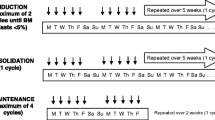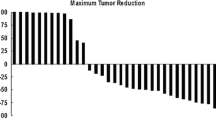Abstract
Background
Single-agent arsenic trioxide has shown promising results in patients with relapsed or refractory multiple myeloma (MM). Because preclinical data suggested greater activity with dexamethasone and ascorbic acid, a phase 2 trial of the combination of arsenic trioxide, dexamethasone, and ascorbic acid in patients with relapsed or refractory MM was conducted.
Methods
Twenty patients in whom no more than two previous therapies had failed were enrolled. The mean age was 62 yr, and 55% of the patients had refractory disease. The regimen consisted of 14- or 15-wk cycles, with the first cycle considered induction, followed by one or two consolidation cycles with a reduced steroid schedule and then a maintenance cycle in responding patients.
Results
The overall response rate was 30%, with at least stable disease in 80% of patients. Median progression-free survival was 316 d in all patients and 584 d in those with a response. The regimen was well tolerated, with most adverse events being mild or moderate.
This study showed the clinical efficacy and tolerability of the combination of arsenic trioxide, dexamethasone, and ascorbic acid. Further study is warranted.
Similar content being viewed by others
References
Hussein MA. Trials of arsenic trioxide in multiple myeloma. Cancer Control 2003;10:370–374.
Hussein MA, Juturi JV, Lieberman I. Multiple myeloma: present and future. Curr Opin Oncol 2002;14:31–35.
Kyle RA, Rajkumar SV. Multiple myeloma. N Engl J Med 2004;351:1860–1873 [erratum in N Engl J Med 2005;352:1163].
Singhal S, et al. Antitumor activity of thalidomide in refractory multiple myeloma. N Engl J Med 1999;341:1565–1571 [erratum in N Engl J Med 2000:342:364].
Richardson PG, et al. A phase 2 study of bortezomib in relapsed, refractory myeloma. N Engl J Med 2003;348:2609–2617.
Soignet SL, et al. United States multicenter study of arsenic trioxide in relapsed acute promyelocytic leukemia. J Clin Oncol 2001;19:3852–3860.
Gallagher RE. Co-biomodulation with arsenic trioxide in multiple myeloma. Leuk Res 2001;25:237–239.
Rousselot P, et al. Arsenic trioxide and melarsoprol induce apoptosis in plasma cell lines and in plasma cells from myeloma patients. Cancer Res 1999;59:1041–1048.
Park WH, et al. Arsenic trioxide-mediated growth inhibition in MC/CAR myeloma cells via cell cycle arrest in association with induction of cyclin-dependent kinase inhibitor, p21, and apoptosis. Cancer Res 2000;60:3065–3071.
Miller WH Jr, et al. Mechanism of action of arsenic trioxide. Cancer Res 2002;62:3893–3903.
Roboz GJ, et al. Arsenic trioxide induces dose- and time-dependent apoptosis of endothelium and may exert an antileukemic effect via inhibition of angiogenesis. Blood 2000;96:1525–1530.
Lew YS, et al. Arsenic trioxide causes selective necrosis in solid murine tumors by vascular shutdown. Cancer Res 1999;59:6033–6037.
Deaglio S, et al. Evidence of an immunologic mechanism behind the therapeutical effects of arsenic trioxide (As2O3) on myeloma cells. Leuk Res 2001;25:227–235.
Hussein MA. Arsenic trioxide: a new immunomodulatory agent in the management of multiple myeloma. Med Oncol 2001;18:239–242.
Grad JM, et al. Ascorbic acid enhances arsenic trioxide-induced cytotoxicity in multiple myeloma cells. Blood 2001;98:805–813.
Dai J, et al. Malignant cells can be sensitized to undergo growth inhibition and apoptosis by arsenic trioxide through modulation of the glutathione redox system. Blood 1999;93:268–277.
Ochi T, Kaise T, Oya-Ohta Y. Glutathione plays different roles in the induction of the cytotoxic effects of inorganic and organic arsenic compounds in cultured BALB/c 3T3 cells. Experientia 1994;50:115–120.
Davison K, et al. Glutathione depletion overcomes resistance to arsenic trioxide in arsenic-resistant cell lines. Leukemia 2003;17:931–940.
Miller WH Jr. Molecular targets of arsenic trioxide in malignant cells. Oncologist 2002;7(Suppl 1): 14–19.
Bahlis NJ, et al. Feasibility and correlates of arsenic trioxide combined with ascorbic acid-mediated depletion of intracellular glutathione for the treatment of relapsed/refractory multiple myeloma. Clin Cancer Res 2002;8:3658–3668.
Hayashi T, et al. Arsenic trioxide inhibits growth of human multiple myeloma cells in the bone marrow microenvironment. Mol Cancer Ther 2002;1:851–860.
Munshi NC, et al. Clinical activity of arsenic trioxide for the treatment of multiple myeloma. Leukemia 2002;16:1835–1837.
Hussein MA, et al. Phase 2 study of arsenic trioxide in patients with relapsed or refractory multiple myeloma. Br J Haematol 2004;125:470–476.
Weber, D., IMiDS—results of phase III studies in relapsed/refractory myeloma. Presentation at the 41st meeting of the American Society of Clinical Oncology Meeting. Orlando, Florida, May 13–17, 2005.
Pandit S, Vesole DH. Relapsed multiple myeloma. Curr Treat Options Oncol 2001;2:261–269.
Durie BG, et al. Magnitude of response with myeloma frontline therapy does not predict outcome: importance of time to progression in Southwest Oncology Group chemotherapy trials. J Clin Oncol 2004;22:1857–1863.
Barbey JT, Pezzullo JC, Soignet SL. Effect of arsenic trioxide on QT interval in patients with advanced malignancies. J Clin Oncol 2003;21:3609–3615.
Ma MH, et al. Arsenic trioxide-mediated growth inhibition and apoptosis in multiple myeloma cells correlated with inhibition of nuclear factor (NF)-κB activity. Blood 2001;98:100a. [Abstract 420].
Author information
Authors and Affiliations
Corresponding author
Rights and permissions
About this article
Cite this article
Abou-Jawde, R.M., Reed, J., Kelly, M. et al. Efficacy and safety results with the combination therapy of arsenic trioxide, dexamethasone, and ascorbic acid in multiple myeloma patients. Med Oncol 23, 263–272 (2006). https://doi.org/10.1385/MO:23:2:263
Received:
Accepted:
Issue Date:
DOI: https://doi.org/10.1385/MO:23:2:263




